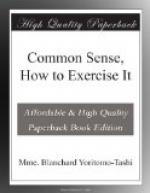“It is only when his act is consummated, that he will think of the consequences which it can entail; the loss of his employment first, then corporal punishment, in severity according to the gravity of the offense; lastly, misery, perhaps the result of forced inactivity.
“On the contrary, the man endowed with common sense will reflect in a flash, by recalling all the different phases which we have described. His intelligence, being appealed to, will represent to him the consequences of a violent action.
“He will find, in common sense, the strength not to respond to an injury at once; but will not forego the right, however, of avenging himself under the guise of a satisfaction which will be all the more easily accorded to him as his moderation will not fail to make an impression in his favor.”
“There is, between common sense and impulse,” says Yoritomo, “the difference that one would find between two coats, one of which was bought ready-made, while the other, after being cut according to the proportions of the one who is to wear it, was sewed by a workman to whom all the resources of his art are known.”
If impulses adopt the same character for every one, common sense adapts itself to the mind, to the sensitiveness, to the worth of him who practises it; it is a garment which is adjusted to the proportions of its owner, and, according to his taste, is elaborate or simple.
Certain people have a tendency to confound intuition and impulse.
These two things, really very different in essence, are only related by spontaneity of thought which gives them birth.
But whereas intuition, a sensation altogether moral, concisely stated, is composed of mental speculations, impulses always resolve themselves into acts and resolutions to act.
Intuition is a sort of obscure revelation, which reason controls only after its formation.
Impulse never engages common sense in the achievements which it realizes. It never decides upon them in advance, and almost always engenders regrets.
It is the result of a defeat in self-control, which will-power and the power of reasoning alone can correct.
Intuition is less spontaneous than impulse.
It is a very brief mental operation, but, nevertheless, very real, which, very indistinctly, touches lightly all the phases of reasoning, in order to reach a conclusion so rapidly that he who conceives it has difficulty in making the transformations of the initial thought intelligible.
It is none the less true that intuition is always inspired by a predicted reflection, but, in spite of this fact, an existing reflection.
Impulse, on the contrary, only admits instinct as its source of existence.
It is the avowed enemy of common sense, which counsels the escape from exterior insinuations that one may concentrate, in order to listen to the voice which dictates to us the abstinence from doing anything until after making a complete analysis of the cause which agitates us.




